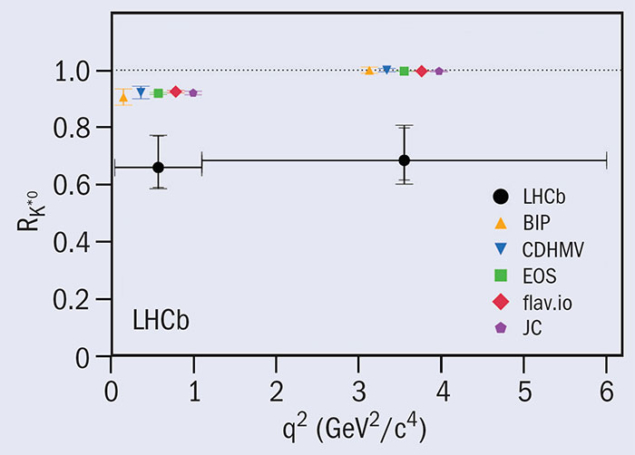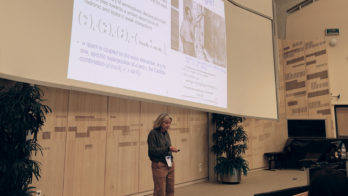
At a seminar at CERN on 18 April, the LHCb collaboration presented new results in flavour physics that show an interesting departure from Standard Model (SM) predictions. The new measurement concerns a parameter called RK*0, which is the ratio of the probabilities that a B0 meson decays to K*0μ+μ– and to K*0e+e– (where the K*0 meson was reconstructed through its decay into a charged kaon K+ and a pion π–).

Lepton universality – a cornerstone of the SM – states that leptons have the same couplings to gauge bosons and therefore that RK*0 is expected to be close to unity (apart from well-understood effects related to the different masses of the leptons, which change this value slightly). Any conclusive observation of a violation of this rule would indicate the existence of physics beyond the SM. Based on analysis of data from Run 1, the LHCb measurement differs from the prediction with a significance between 2.1 and 2.5 standard deviations in the two regions of q2 (the μ+μ– or e+e– invariant mass squared) in which the measurement is performed.
Three years ago, LHCb found a similar discrepancy for the quantity RK – in which the B0 meson is replaced by a B+ and the K*0 meson by a K+. In addition, another class of measurements concerning different ratios of B-meson decay rates involving τ and muon leptons also exhibit some tensions with predictions. While intriguing, none of the differences are yet at the level where they can be claimed to exhibit evidence for physics beyond the SM.
The LHCb collaboration has a wide programme of lepton-universality tests based on different R measurements in which other particles replace the K*0 or K+ mesons in the ratios. The RK*0 and RK measurements so far were obtained using the entire Run 1 data sample, corresponding to an integrated luminosity of 3 fb–1 at an energy of 7 and 8 TeV. Data collected in Run 2 already provide a sample more than twice as large, and it is therefore of great importance to see whether updates of the present analysis will confirm or rule out the discrepancies.





